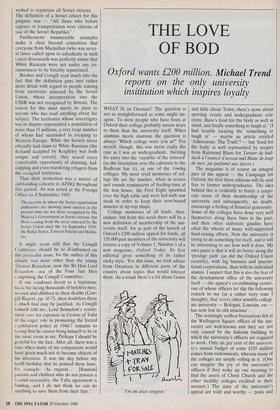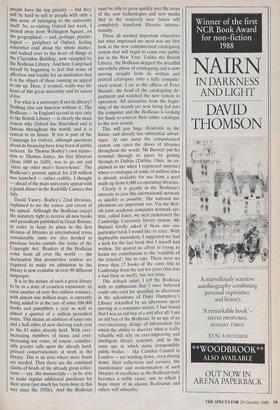THE LOVE OF B OD
Oxford wants £200 million. Michael Trend reports on the only university insititution which inspires loyalty
WHAT IS an Oxonian? The question is not as straightforward as some might im- agine. To most people who have been at Oxford their college probably means more to them than the university itself. When alumnus meets alumnus the question is always 'Which college were you at?' For myself, though, this was never really the case as I was an undergraduate, thirsting for entry into the 'republic of the lettered' (as the inscription over the entrance to the Bodleian has it), at one of the rowing colleges. My most vivid memories of col- lege life are the lunches, when in scenes and sounds reminiscent of feeding-time at the lion house, the First Eight sprawled over the high table and were fed with raw steak in order to keep their iron-bound muscles in tip-top shape.
College memories of all kinds, then, endure; but from this week there will be a new definition of membership of the uni- versity itself, for as part of the launch of Oxford's £200 million appeal for funds, all 120,000 past members of the university will receive a copy of Volume 1, Number 1 of a new magazine, Oxford Today. Its first editorial gives something of its rather sticky style: 'For this issue, we took advice from Oxonians in different parts of the country about topics that would interest them. As a result there's a lot about Gown 'I'm an asset stripper.' and little about Town; there's news about sporting events and undergraduate con- cerns; there's food for the body as well as mind, and finally something to laugh at.' (I had trouble locating the 'something to laugh at' — maybe an article entitled `Admissions: The Truth'? — but 'food for the body' is well represented by recipes from Raymond Blanc for Tartare de had- dock a l'emince d'avocat and Blanc de loup de mer, jus parfume aux epices.) The magazine is of course an integral part of the appeal — the Campaign for Oxford; the first three editions will be sent free to former undergraduates. The idea behind this is evidently to foster a corpo- rate sense of their membership of the university and subsequently, no doubt, encourage a feeling of financial generosity. Some of the colleges have done very well themselves along these lines in the past, and their often elaborate gaudies have oiled the wheels of many well-supported fund-raising efforts. Now the university is trying to do something for itself, and it will be interesting to see how well it does. My own guess is that it will do better along the `prestige path' (as did the Oxford Union recently), with big business and interna- tional corporations, than with its individual alumni. I suspect that this is also the fear of the development office of the university itself — the appeal's co-ordinating centre, one of whose officers let slip the following remark to me (in a rather testy tone I thought), that 'every other sensible collegi- ate university — Bologna, Louvain, etc has now lost its old structure'.
The seemingly endless frustrations felt at the Wellington Square offices of the uni- versity are well-known and they are not only caused by the hideous building in which the university's officers are required to work. Only six per cent of the universi- ty's annual budget of some £105 million comes from endowments, whereas many of the colleges are simply rolling in it. (One can imagine the joy of the university's officers if they woke up one morning to find the assets of Christ Church and the other wealthy colleges credited to their account.) The aims of the university's appeal are wide and worthy — posts and people have the top priority — but they will be hard to sell to people with only a dim sense of belonging to the university itself. So, re-visiting Oxford last week, I turned away from Wellington Square, on the geographical — and, perhaps, psycho- logical — periphery of Oxford, feeling somewhat cold about the whole matter, and walked over to the heart of things at the Clarendon Building, now occupied by the Bodleian Library. And here I surprised myself by beginning to feel that sense of affection and loyalty for an institution that it is the object of those running an appeal to stir up. Here, it seemed, really was the heart of this great university and its raison d'etre.
For what is a university if not its library? Nothing else can function without it. The Bodleian — in England second in size only to the British Library — is clearly the main reason why Oxford has flourished and is famous throughout the world; and it is central to its future. It too is part of the Campaign for Oxford, although questions about its financing have long been of public concern. Sir Thomas Bodley's own injunc- tion to Thomas James, his first librarian (from 1600 to 1620), was to go out and 'stirre up other men's benevolence'. The Bodleian's present appeal for £10 million was launched — rather craftily, I thought — ahead of the main university appeal with a grand dinner in the Radcliffe Camera this July.
David Vaisey, Bodley's 22nd librarian, explained to me the nature and extent of his appeal. Although the Bodleian enjoys the statutory right to receive all new books and periodicals published in Great Britain, in order to keep its place in the first division of libraries in international terms considerable sums are also needed to purchase books outside the terms of the Copyright Act. Readers at the Bodleian come from all over the world — the declaration that prospective readers are required to make on admission to the library is now available in over 90 different languages.
It is in the nature of such a great library to be in a state of ceaseless expansion: its total number of over five million volumes, with almost one million maps, is currently being added to at the rate of some 100,000 books and pamphlets a year as well as almost a quarter of a million periodical items. This means an addition of some one and a half miles of new shelving each year to the 83 miles already held. With ever- increasing numbers of items and ever- increasing use come, of course, consider- ably greater calls upon the already hard- pressed conservationists at work in the library. This is an area where more funds are needed. Then there are the continual claims of heads of the already great collec- tions — say, the manuscripts — to be able to make regular additional purchases for their areas (not much has been done in this way since the 1950s). And the Bodleian must be able to grow quickly into the areas of the new technologies and new media that in the relatively near future will completely transform libraries interna- tionally.
These all seemed important objectives but what impressed me most was my first look at the new computerised cataloguing system that will begin to come into public use in the New Year. Unlike the British Library, the Bodleian skipped the dreadful microfiche phase of cataloguing and is now moving straight from its written and printed catalogues onto a fully compute- rised system. I sat in the offices of Peter Burnett, the head of the cataloguing de- partment and watched the new system in operation. All accessions from the begin- ning of the month are now being fed into the computer and the Bodleian is looking for funds to convert their entire catalogue to the new system.
This will pay huge dividends in the future, and already has substantial advan- tages. At one jump the computerised system can open the doors of libraries throughout the world. Mr Burnett put his terminal through its paces by getting through to Dublin (Dublin, Ohio, he ex- plained to me when I registered surprise) where a catalogue of some 16 million titles is already available for use from a pool made up from 6,000 co-operating libraries.
Clearly it is greatly in the Bodleian's interests to join this international network as quickly as possible. The national im- plications are important too. Via the Brit- ish joint academic computer network sys- tem, called Janet, we next penetrated the Cambridge University library system. Mr Burnett kindly asked if there was one particular book I would like to trace. With deplorable immodesty I suggested we had a look for the last book that I myself had written. He spared no effort in trying to locate my contribution to the 'republic of the lettered'; but in vain. There were no fewer than 17 books of the same title in Cambridge from the last ten years (this was a bad blow in itself), but not mine.
This setback apart, I left the Bodleian with an enthusiasm that I once believed could only exist for spending an afternoon in the splendours of Duke Humphrey's Library rekindled by an afternoon spent peering at a computer screen. I had found that I was an old boy of a sort after all; I am an old boy of the Bodleian. In an age of an ever-increasing deluge of information (in which the ability to discover what is really valuable will rely on ever-improving and intelligent library systems), and in the same age in which many irresponsible public bodies — like Camden Council in London — are winding down, even closing down, their collections and services, the maintenance and modernisation of such libraries of excellence as the Bodleian truly becomes a noble cause; one to which I hope many of us alumni Bodleianae and others will subscribe.



























































 Previous page
Previous page